
Cardiology Research and Practice
Scope & Guideline
Elevating the standards of cardiology research and practice.
Introduction
Aims and Scopes
- Clinical cardiology and patient management:
Research in this area includes studies on diagnosis, treatment strategies, and long-term management of various cardiovascular diseases, including acute myocardial infarction, heart failure, and atrial fibrillation. - Pathophysiology and molecular mechanisms:
The journal publishes work exploring the underlying biological processes of cardiovascular diseases, such as ischemia/reperfusion injury, myocardial remodeling, and the role of biomarkers in disease progression. - Innovative therapeutic approaches:
This includes studies on pharmacological interventions, interventional cardiology techniques, and advancements in surgical procedures, such as catheter ablation and valve replacement. - Epidemiology and risk factors:
Research focusing on population studies that identify risk factors for cardiovascular diseases, including genetic predispositions, lifestyle factors, and comorbid conditions. - Technological advancements in cardiology:
The journal covers innovations in diagnostic tools, imaging techniques (e.g., cardiac MRI, echocardiography), and wearable technology for monitoring cardiovascular health. - Patient-centered outcomes and quality of life:
Studies that assess the impact of cardiovascular diseases and treatments on patients' quality of life, psychological well-being, and adherence to treatment regimens.
Trending and Emerging
- Precision medicine and genomics in cardiology:
There is a growing emphasis on personalized approaches to cardiovascular treatment, including genetic testing and biomarker identification to tailor therapies to individual patient profiles. - Integration of technology and telehealth:
The rise of telemedicine and digital health solutions in cardiology is evident, with increasing research on remote monitoring, mobile health applications, and their impact on patient care. - Management of cardiovascular complications post-COVID-19:
Research focusing on the cardiovascular implications of COVID-19, including long-term effects on heart health and the management of patients with pre-existing conditions, has surged. - Interventional and minimally invasive techniques:
There is an increasing trend in studies related to new interventional strategies, including catheter-based therapies and robotic surgeries, reflecting advancements in procedural cardiology. - Focus on lifestyle interventions and prevention:
Emerging studies are highlighting the importance of lifestyle modifications, exercise, and dietary interventions in the prevention and management of cardiovascular diseases.
Declining or Waning
- Traditional pharmacological approaches without innovative strategies:
There has been a noticeable decrease in studies solely focused on standard pharmacotherapy for cardiovascular diseases, indicating a shift towards more integrative and innovative treatment modalities. - Basic science studies without clinical correlation:
Research that lacks direct clinical application or relevance, particularly basic science studies that do not translate into practical interventions, appears to be less frequently published. - Over-reliance on retrospective studies:
The journal has seen a reduction in the publication of retrospective studies, likely in favor of more rigorous prospective cohort studies and randomized controlled trials that offer stronger evidence. - Limited focus on specific rare cardiovascular conditions:
Research on less common cardiovascular conditions has decreased, possibly due to the rising interest in more prevalent diseases and syndromes.
Similar Journals
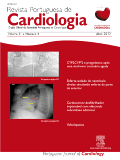
Revista Portuguesa de Cardiologia
Advancing cardiovascular knowledge for a healthier tomorrow.Revista Portuguesa de Cardiologia, published by Elsevier España SLU, stands as a pivotal resource in the realm of Cardiology and Cardiovascular Medicine. With its origins tracing back to 1970, this journal has cultivated a robust academic presence, achieving a 2023 Q3 ranking in its category, and currently holding a position of #220 out of 387 on the Scopus rankings, placing it within the 43rd percentile of its field. This open access journal, available since 2011, aims to disseminate high-quality research and insights relevant to contemporary cardiovascular issues. Its commitment to accessibility and knowledge exchange enhances its importance for clinicians, researchers, and students alike, fostering a more informed community in the fight against cardiovascular diseases. Operating from its base in Barcelona, Spain, the journal welcomes contributions that further the understanding and treatment of heart conditions, contributing significantly to the advancement of cardiovascular health.

Journal fur Kardiologie
Illuminating the Path of Cardiovascular Innovation.The Journal fur Kardiologie, published by KRAUSE & PACHERNEGG GMBH, is a pivotal resource in the field of Cardiology and Cardiovascular Medicine. With an ISSN of 1024-0098 and an E-ISSN of 1680-936X, this journal has played a significant role in disseminating valuable research and clinical studies from 1998 until its coverage discontinuation in Scopus in 2017. Despite its Scopus rank being relatively low at #316/324 in its category, it continues to serve as a platform for emerging cardiology research. The journal’s scope encompasses various aspects of cardiovascular health, providing insights that are crucial for researchers, professionals, and students alike seeking to advance their knowledge and practice in cardiology. While the journal is not open access, its contributions to the field are essential for those looking to stay informed about the latest developments in cardiovascular medicine.
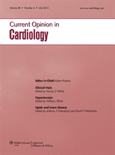
CURRENT OPINION IN CARDIOLOGY
Exploring the forefront of cardiovascular innovation.CURRENT OPINION IN CARDIOLOGY, published by LIPPINCOTT WILLIAMS & WILKINS, is an esteemed journal in the field of cardiology that has been serving the academic community since 1988. With a robust focus on the latest developments and emerging trends in cardiovascular medicine, this journal aims to bridge the gap between clinical practice and research, offering critical insights and expert commentary. The journal is recognized in the medical community, achieving a 2023 Scopus rank of #148 out of 387 in its category, placing it in the 61st percentile. Although it operates under a subscription-based model, CURRENT OPINION IN CARDIOLOGY remains an essential resource for researchers, practitioners, and students seeking cutting-edge knowledge and advancements in cardiology. As a Q2 journal in the field, it continues to foster dialogue and provide a platform for disseminating impactful cardiovascular research, ultimately contributing to improved patient outcomes and informed clinical decisions.

Journal of Cardiovascular Development and Disease
Exploring the frontiers of cardiac development and disease.Journal of Cardiovascular Development and Disease, an esteemed publication by MDPI, has been a dedicated platform for disseminating cutting-edge research since its inception in 2014. Based in Switzerland, this Open Access journal not only provides unrestricted access to its content but also fosters global collaboration among scholars focusing on cardiovascular health and disease development. With an impressive focus classified as Q1 in Pharmacology, Toxicology and Pharmaceutics for 2023, it attracts a diverse range of interdisciplinary research, supporting advancements in pharmacological applications relevant to cardiac conditions. The journal's ongoing convergence through 2024 highlights its commitment to the evolving landscape of cardiovascular research, making it a vital resource for researchers, professionals, and students alike who are keen to contribute to and learn from significant developments in this critical field.
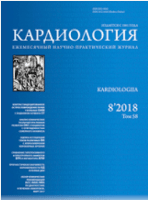
KARDIOLOGIYA
Empowering the Future of Heart Disease ManagementKARDIOLOGIYA is a renowned academic journal in the field of cardiology, published by the Russian Heart Failure Society. Since its inception in 1961, this journal has been dedicated to disseminating cutting-edge research in cardiovascular medicine, contributing to the global understanding of heart-related diseases and their management. With a significant publication history that spans over six decades, KARDIOLOGIYA provides a platform for both established researchers and emerging scholars to publish their findings. Despite its current Q4 category ranking in the 2023 Cardiology and Cardiovascular Medicine category, the journal plays a crucial role in promoting regional insights and advancements in cardiology, while striving towards higher visibility and impact within the academic community. While not an open-access journal, the journal is accessible to institutions and professionals in the Russian Federation and beyond, fostering collaboration and knowledge sharing among healthcare professionals. With a Scopus rank of #259 among 387 journals, it is well-positioned to enhance discourse in the field and support the development of innovative approaches to cardiovascular care.

Cardiology Journal
Innovating the landscape of cardiovascular medicine.Cardiology Journal, published by VIA MEDICA, stands as a prominent resource in the field of cardiology and cardiovascular medicine, with an ISSN of 1897-5593 and an E-ISSN of 1898-018X. Recognized for its Open Access model established since 1994, this journal facilitates widespread dissemination of critical research findings, allowing practitioners and researchers globally to access valuable insights without barriers. Based in Poland, with an address at UL SWIETOKRZYSKA 73, 80-180 GDANSK, it has achieved a respectable Q2 classification in 2023 for both Cardiology and Miscellaneous Medicine categories, reflecting its influence and quality within the scholarly community. With a Scopus ranking placing it at #117 out of 387 in Cardiology, it lies within the 69th percentile, underpinning its commitment to advancing knowledge in cardiovascular health. The journal’s converged years extending from 2006 to 2024 ensure it captures ongoing developments in a rapidly evolving field. As such, the Cardiology Journal serves as an indispensable platform for researchers, professionals, and students dedicated to exploring the frontiers of cardiac science and improving patient care.
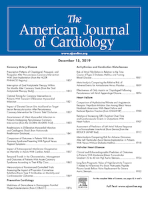
AMERICAN JOURNAL OF CARDIOLOGY
Leading the Charge in Cardiovascular Discovery and ExcellenceThe American Journal of Cardiology is a leading peer-reviewed journal in the field of Cardiology and Cardiovascular Medicine, published by Excerpta Medica Inc-Elsevier Science Inc. Since its inception in 1958, the journal has consistently contributed to the advancement of cardiovascular research, providing a platform for groundbreaking studies and clinical findings that shape modern medical practices. With an impressive impact factor placing it in the Q1 category in its field for 2023, it ranks among the top journals in medicine, with a rank of #155 out of 387 in the Scopus database, reflecting its significance and rigorous editorial standards. The journal is committed to disseminating high-quality research that fosters innovation and enhances clinical outcomes in cardiology. Although it does not provide Open Access options, the American Journal of Cardiology remains an essential resource for researchers, healthcare professionals, and students looking to deepen their understanding of cardiovascular health.

Netherlands Heart Journal
Empowering Cardiovascular Excellence Through Collaborative ResearchNetherlands Heart Journal is a premier academic publication dedicated to advancing knowledge in the field of cardiology and cardiovascular medicine. Published by BOHN STAFLEU VAN LOGHUM BV, this journal has established itself as a critical platform for researchers, professionals, and students seeking to explore groundbreaking findings and innovative practices in cardiovascular health. With an ISSN of 1568-5888 and E-ISSN 1876-6250, the journal boasts a respectable Q2 ranking in the Cardiology and Cardiovascular Medicine category, placing it in the top half of its field according to the 2023 quartiles. The Scopus ranking places it 130th out of 387 in the relevant category, indicating a commendable percentile rank of 66th, which attests to its influence and quality of published research. Spanning from 2005 to 2024, the journal endeavors to include a diverse array of topics, encompassing clinical practice, technological innovations, and public health considerations related to cardiovascular diseases. Researchers and practitioners are encouraged to engage with the journal's robust content, contributing to and benefiting from the collaborative effort to enhance cardiovascular health worldwide.
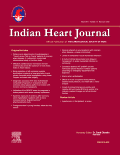
Indian Heart Journal
Advancing Cardiac Knowledge for a Healthier TomorrowIndian Heart Journal, published by Elsevier, is a distinguished peer-reviewed journal dedicated to the field of cardiology and cardiovascular medicine. Founded in 1961, this journal has been a pivotal resource for researchers, healthcare professionals, and students, providing a platform for innovative studies and insights into heart health. The journal transitioned to an Open Access model in 2013, ensuring widespread dissemination of vital research findings to enhance global understanding of cardiovascular diseases. Ranked in the Q3 category for Cardiology and Cardiovascular Medicine in 2023, it holds a reputable position in the medical community, with a Scopus rank of #222 out of 387 journals in the same field, placing it in the 42nd percentile. The Indian Heart Journal strives to foster advances in clinical practice and research while addressing the unique cardiac health challenges faced in India and beyond.
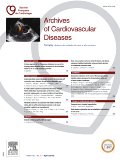
Archives of Cardiovascular Diseases
Advancing cardiovascular health through groundbreaking research.The Archives of Cardiovascular Diseases, published by Elsevier Masson, stands as a leading journal in the field of cardiology and cardiovascular medicine, with an impressive impact factor that underscores its relevance and influence. This esteemed journal, recognized in the Q2 category for both cardiology and miscellaneous medicine, aims to disseminate groundbreaking research, innovative methodologies, and clinical advancements that can shape the future of cardiovascular health. With its diverse array of open access options, researchers and students alike have the ability to engage with high-quality content, ensuring that cutting-edge findings are accessible globally. Since its inception in 2008, the journal has actively contributed to the advancement of knowledge in cardiovascular diseases, fostering collaboration among clinicians, researchers, and educators. Headquartered in Paris, France, Archives of Cardiovascular Diseases remains committed to enhancing our understanding of cardiovascular health and improving patient outcomes worldwide.